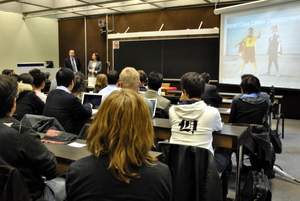Not-So-Innocents Abroad: The life of an expatriate lawyer adapting to life abroad can be summarized in three simple phases: “Honeymoon; Hate; and Hey, It’s Okay…”

To general laughter from the 50 students assembled in a classroom in New Chancellor Day Hall, Baker & McKenzie recruiter Christopher Aide elaborated on life as a lawyer abroad: “At first, you love it: it’s exciting, the food is fantastic, six weeks of vacation!” he said, speaking from his own experience working in Germany, England and Wales. But then reality sets in with cultural differences as basic as how to work a washer-dryer combo or to even buy bananas. “Then, of course, you find a balance.”
Aide and Baker & McKenzie colleague Tara Randell were speaking to students as part of an event hosted by the Asia Pacific Law Association of McGill (APLAM) in November designed to get McGill students thinking about an international legal career.
“To my knowledge, Baker & McKenzie is one of the only international firms with an office in Canada and it is a highly-ranked law firm in Asia,” said APLAM executive Cindy Kou, adding that Baker & McKenzie consistently hires many McGill students as summer or articling interns. “We wanted to bring Christopher to talk to other students about the how-tos of an international legal career,” she explained.
“McGill is an amazing brand,” Aide corroborated at the event, extolling the Faculty’s integrated common and civil law program. “It is the only school that will be instantly recognized in Germany, for example, and it has name recognition around the world.”
The event attracted a diverse crowd of undergraduate and graduate students, including those who had grown up in Canada and worked in Asia as legal interns, investment bankers and teachers, as well as those from Iran, Cambodia, Zimbabwe, France, the US and Mauritius. Their questions touched on everything from variances in accreditation standards to the challenges of moving back and forth between countries.
In response to questions about life as an international lawyer, Aide and Randell painted a picture that spanned time zones, geographic borders and even the physical space of a typical law office. Embarking on an international legal career means re-envisioning one’s workspace, Aide said, pointing out that laptops and tablet computers make it possible to work from anywhere. International law offices will become more like a hotelling stations, Randell predicted, where lawyers use desk space and office facilities temporarily in multiple locations across the globe.
Collaboration will be similarly fluid. “Christopher has a trick he likes to show where he pulls up his e-mails from the past hour on his Blackberry,” Randell said. “Two will be from Paris, two from New York and two Beijing. You have to be able to work with people around the world.”
Concluded Aide: “Historically, in Canada, if we summarized the last half of the twentieth century in one word, it would be ‘tolerance.’ What is it going to be for this half century? Fluency.”
The Environmental & Animal Welfare Impacts of Intensive Farming: exploring the legal framework and potential avenues for change
By Sophie Gaillard
The areas of environmental and animal law found common ground on November 8, 2010, when two student groups jointly hosted a panel discussion on intensive farming at the Law Faculty. The Student Animal Legal Defense Fund at McGill and Environmental Law McGill chose the subject of intensive farming because it provided a chance to examine a pressing issue that unites the groups’ interests and concerns with the state of the environment, the welfare of animals, and public health.
We know that the intensive farming methods of the past decades have vastly boosted crop yields and meat and dairy production while keeping food costs quite low, and society has benefited as a result. But society also pays a very high, often overlooked, cost for these gains – significant environmental pollution, negative consequences for ecosystems and public health, and serious adverse effects on animal welfare. The question is: how can we feed the world without trashing it?
The impacts of intensive farming are often out of sight and mind, but they are widely prevalent here in Quebec, and around the world. The three panel speakers at this event addressed the impacts of intensive farming from scientific, social, and legal perspectives, discussed current and alternative methods of farming, examined the current legal framework governing farming in Canada and the US, and explored possible avenues for mitigating the negative impacts of food production.
The panelists included: Kaitlyn Mitchell, a staff lawyer with Ecojustice, Canada’s leading environmental law organization; Navin Ramankutty, Assistant Professor of Geography and Earth System Science at McGill, and Canada Research Chair in Land-Use and Land-Cover Change; and David Wolfson, Adjunct Professor of Animal Law at Columbia Law School and NYU Law School.
Mary Race, Environmental Law McGill
Sophie Gaillard, Student Animal Legal Defense Fund at McGill
